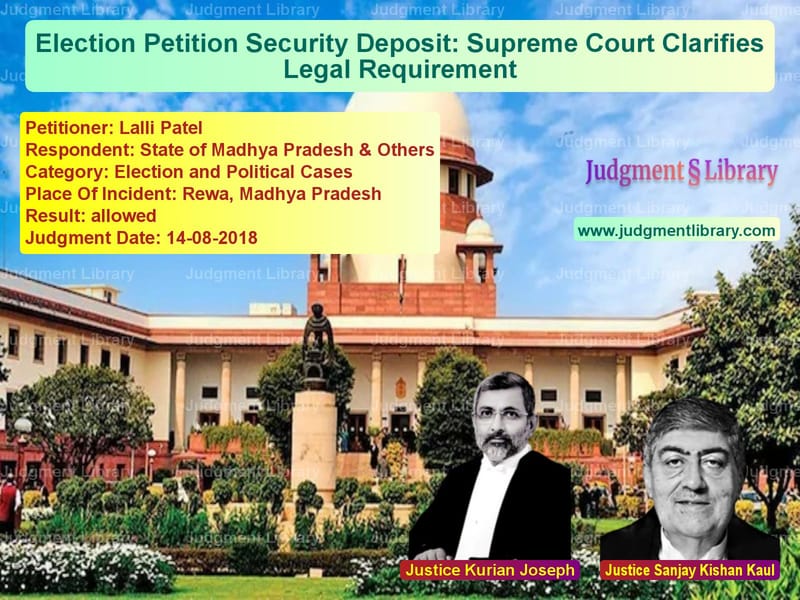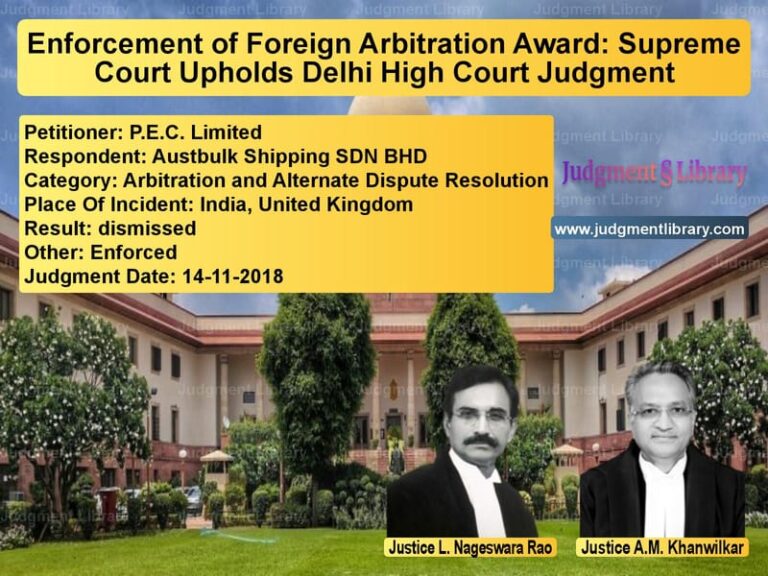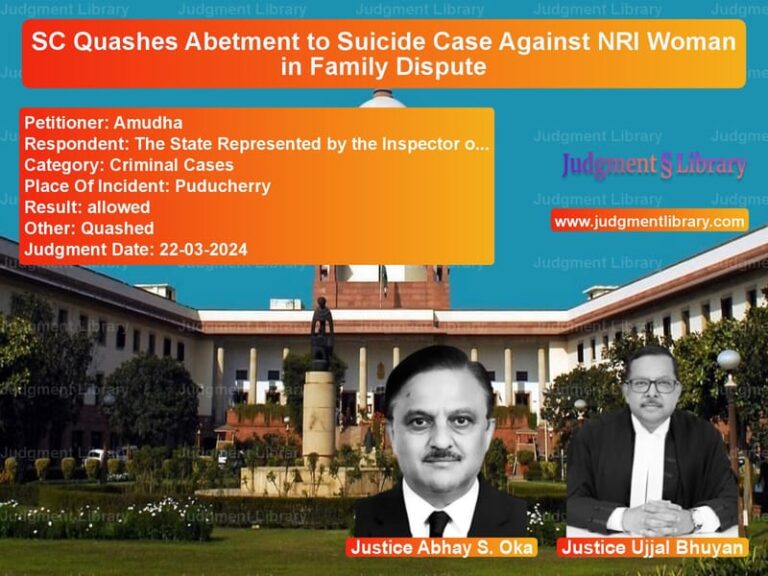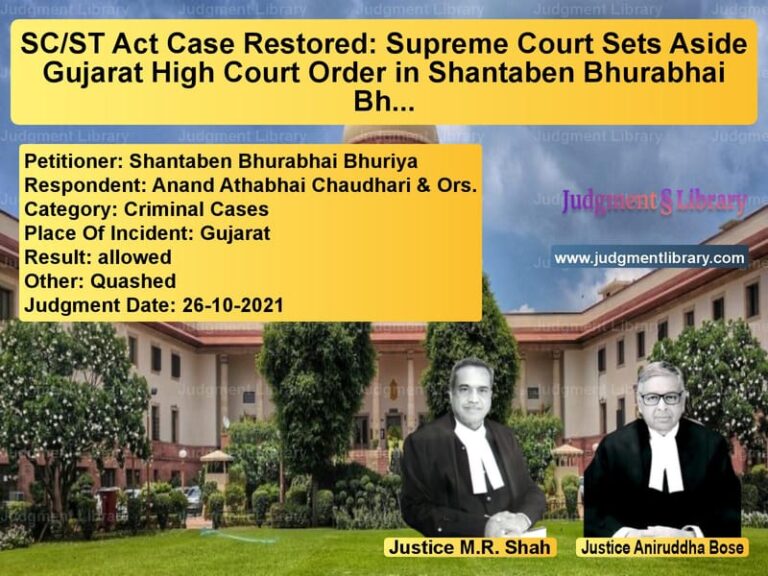Election Petition Security Deposit: Supreme Court Clarifies Legal Requirement
The Supreme Court of India recently ruled on a significant election law dispute involving the security deposit requirement for filing an election petition under the Madhya Pradesh Panchayat Raj Evam Gram Swaraj Adhiniyam, 1993. The case, Lalli Patel v. State of Madhya Pradesh & Others, centered around the interpretation of Rule 7 of the Madhya Pradesh Panchayat (Election Petition, Corrupt Practices, and Disqualification for Members) Rules, 1995, which governs the deposit of security.
The core issue was whether a security deposit must be made directly to the Specified Officer or if depositing the amount in a government treasury and presenting proof of deposit suffices. The Supreme Court’s decision overturned the High Court’s ruling, reaffirming that the essential requirement is the deposit in the name of the Specified Officer, not the mode of payment.
Background of the Case
The case arose when Lalli Patel, the appellant, filed an election petition challenging the election results under Section 122 of the Madhya Pradesh Panchayat Raj Act, 1993. However, the contesting respondent filed an application under Rule 11 of the 1995 Rules, arguing that the petition was not maintainable since the required security deposit of Rs. 500 was not made with the Specified Officer.
According to Rule 7 of the 1995 Rules:
“At the time of presentation of an election petition, the petitioner shall deposit with the specified officer a sum of Rs.500/- as security. Where the election of more than one candidate is called in question, a separate deposit of an equivalent amount shall be required in respect of each such returned candidate.”
Arguments Presented
Respondent’s Argument
The contesting respondent, supported by the State, argued that the deposit must be made directly with the Specified Officer, as the rule states “deposit with the specified officer.” They contended that the appellant’s deposit in a government treasury did not meet the requirement since it was not physically handed over to the officer.
Appellant’s Argument
The appellant countered this by asserting that the security deposit requirement was fulfilled by making a treasury deposit in the name of the Specified Officer and presenting proof of deposit. The appellant argued that Rule 7 only requires the security to be deposited in the name of the Specified Officer, not necessarily in physical cash.
High Court’s Decision
The High Court ruled in favor of the respondent, stating that the deposit must be made directly to the Specified Officer, and a treasury deposit does not satisfy the requirement. The Single Judge Bench dismissed the election petition on this technical ground. This decision was upheld by the Division Bench in an intra-court appeal.
Supreme Court’s Observations
The Supreme Court, comprising Justices Kurian Joseph and Sanjay Kishan Kaul, found the High Court’s interpretation too restrictive. The Court emphasized that Rule 7 only mandates a “deposit of security” and does not specify that it must be made in cash before the Specified Officer.
The Court observed:
“We are afraid that the stand taken by the High Court cannot be appreciated. The requirement of Rule 7 is ‘deposit of security’ and not ‘payment of security’ in cash before the Specified Officer. What is relevant and mandatory is the deposit of security in the name of the Specified Officer, and the mode or manner of deposit is irrelevant.”
The Court further noted that even if payment is made directly to the Specified Officer, the money must eventually be deposited into the government treasury. Hence, a treasury deposit made in the name of the Specified Officer should be considered valid.
Reference to Precedents
The Supreme Court referred to the Madhya Pradesh High Court’s previous ruling in Tika Ram v. Darshanlal (1988), where it was held:
“It is not complained that the money deposited in the Bank was not deposited in the name of prescribed authority. We do not read anything in the petition to suggest that the deposit was so made that the prescribed authority had no control over the money deposited.”
The Court reaffirmed that as long as the deposit is made in the name of the prescribed authority, the mode of payment is immaterial.
Supreme Court’s Ruling
The Supreme Court allowed the appeal and set aside the High Court’s judgment. It restored the order of the Presiding Officer, Collector, Rewa, which had initially accepted the appellant’s election petition.
The Court directed:
“The Specified Officer is directed to dispose of the Election Petition expeditiously, taking note of the fact that the prescribed period of six months has expired a long time ago.”
Implications of the Judgment
- Clarification on Election Petition Procedures: The ruling provides clarity on how security deposits should be made, preventing unnecessary technical dismissals of election petitions.
- Flexibility in Deposit Methods: By allowing treasury deposits, the Court has reduced procedural rigidity and ensured that genuine petitions are not rejected on minor technicalities.
- Judicial Efficiency: The judgment emphasizes the need for timely disposal of election disputes, reinforcing the importance of election laws in preserving democratic processes.
Conclusion
The Supreme Court’s ruling in Lalli Patel v. State of Madhya Pradesh is a significant decision in election law, ensuring that procedural requirements do not become unreasonable obstacles to seeking justice. The judgment underscores that legal provisions should be interpreted in a way that upholds the spirit of fair electoral practices rather than imposing unnecessary technical burdens.
Petitioner Name: Lalli Patel.Respondent Name: State of Madhya Pradesh & Others.Judgment By: Justice Kurian Joseph, Justice Sanjay Kishan Kaul.Place Of Incident: Rewa, Madhya Pradesh.Judgment Date: 14-08-2018.
Don’t miss out on the full details! Download the complete judgment in PDF format below and gain valuable insights instantly!
Download Judgment: Lalli Patel vs State of Madhya Prad Supreme Court of India Judgment Dated 14-08-2018.pdf
Direct Downlaod Judgment: Direct downlaod this Judgment
See all petitions in Public Interest Litigation
See all petitions in Legislative Powers
See all petitions in Judgment by Kurian Joseph
See all petitions in Judgment by Sanjay Kishan Kaul
See all petitions in allowed
See all petitions in supreme court of India judgments August 2018
See all petitions in 2018 judgments
See all posts in Election and Political Cases Category
See all allowed petitions in Election and Political Cases Category
See all Dismissed petitions in Election and Political Cases Category
See all partially allowed petitions in Election and Political Cases Category







